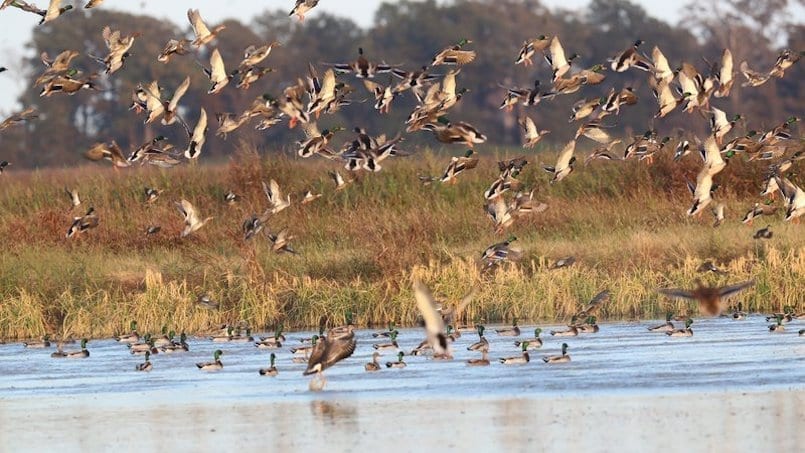06 Jan 2021 Habitat improves, but not as expected; ducks still lagging
It may still be a while before things look like the above photo in many duck hunting holes. While Arkansas experienced more rain last week than what it had seen through a dry late fall/early winter, the expected flooding for fields and other duck habitat in much of the state didn’t reach expectations, according to Luke Naylor, Arkansas Game and Fish Commission waterfowl program coordinator.

“There were predictions at one point for a pretty extensive, 4- to 6-inch rain band, and if you watched that thing, the storm kind of turned on its axis and everything shifted south of (Interstate) 40. I had expected the Arkansas River Valley, a lot of those agriculture fields around Ed Gordon (Point Remove WMA) and Petit Jean to get overbank flooding for the first time, but that didn’t happen. They didn’t get much, or at least not enough,” he said.
The long-term forecast isn’t promising for more duck habitat either. And this isn’t just the case for Arkansas. Missouri has been dry, and the entire Mid-Continent encompassing the Central and Mississippi duck flyways has seen well-above-average temperatures in the late fall/early winter, Naylor says.
With less habitat than usual for January, ducks have no reason to get out and about from the safe-haven of refuge rest areas and sanctuaries where they feel less hunting pressure, and with clear skies they’ve been nocturnally feeding while roosting during the day, in many cases, Naylor says.
As for duck sightings in state, the AGFC has an aerial survey team of biologists out around the state this week for the first of two scheduled January surveys. Anecdotally from what he’s been told, Naylor said, “I’ve heard early reports from the aerial surveys that don’t indicate a dramatic increase in ducks, for sure.”
Is there anywhere he’s heard that is consistently harvesting ducks? “Nope. I haven’t heard of a single place where they are doing consistently well. There may be some that are, but typically the ones that are killing many ducks aren’t talking.”
Content submitted by Jim Harris, Managing Editor of Arkansas Wildlife Magazine











